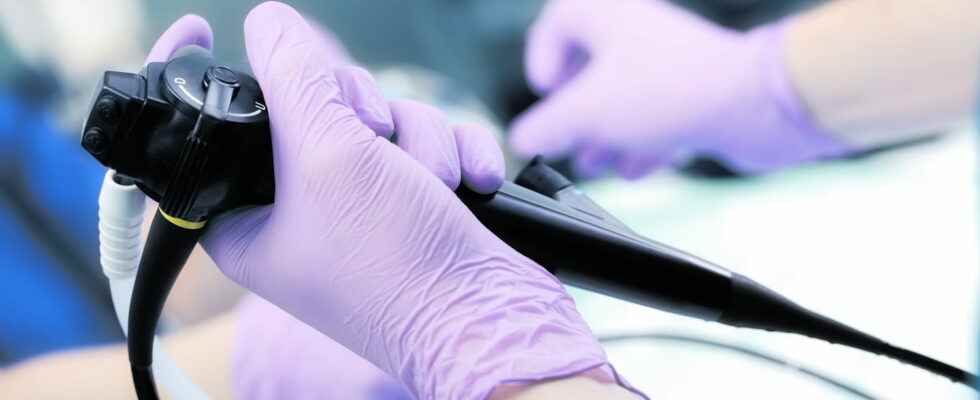Bronchial fibroscopy is an examination which consists of introducing through the upper respiratory tract (nose or mouth) a small flexible tube connected to a camera to the lungs. It will thus make it possible to visualize the bronchi and to take samples.
Definition: what is a bronchial fibroscopy?
“On the same principle as gastric fibroscopy for the stomach, bronchial fibroscopy, or bronchoscopy, is a examination which consists in exploring the bronchi of a person in order to visualize anomalies and take samples (aspiration of secretions, biopsies, lymph node puncture, etc.)“, summarizes Dr. Christophe Brousse, pulmonologist. This examination is essential for the diagnosis of lung diseases. It allows you to search for infections, inflammation or even cancer cells.
What are the indications for bronchial fibroscopy?
The indications are multiple. “Fiberoptic bronchoscopy is frequently used to aid in the diagnosis of many lung diseases, particularly for respiratory infections, cancers or chronic inflammatory diseases lung“, continues the specialist. It often intervenes following medical imaging. “Beyond the major diagnostic interest, bronchial fibroscopy is also of therapeutic interest. Indeed, in case of bronchial tumor that obstructs the bronchi, it can be sprayed with a laser. Similarly, bronchial fibroscopy can help remove a foreign body stuck in the bronchi“. In these indications, it is an emergency and the examination will be carried out in the context of hospitalization with specific equipment.
The exam takes place in hospital or clinic because it requires a technical platform. “Fiberoptic bronchoscopy is most often performed under general anesthesia, on an outpatient basisemphasizes the practitioner. The exam lasts about 15 minutes. The pulmonologist who performs the examination introduces the fiberscope through the nose or through the mouth. Patients are then kept under observation for two hours.“. Endoscopy can also be done if necessary under local anesthesia. This examination is painless but unpleasant.
Do you have to be fasting?
“It is necessary to be fasting at the time of the exam“, insists the doctor. “A pre-anesthesia consultation is carried out before the examination and makes it possible to recall the instructions in relation to the usual medications and duration of fasting“. Regular medication should never be stopped without the advice of a doctor.
Which anesthesia for a bronchial fibroscopy?
“In most cases, bronchial fibroscopy is performed under general anesthesia. But it can also be done under local anesthesia“.
What is the duration of a bronchial fibroscopy?
“The exam lasts about fifteen minutes but can be prolonged up to 1 hour sometimes depending on the gesture (unblocking, lymph node puncture, etc.)“, notes our interlocutor. Indeed, during this examination, the doctor may have to take some tissue located on the bronchial wall or a bit of lung using forceps (biopsy) or collect secretions.
Not all results are immediately available. It’s necessary wait a few days or more if cultures are carried out in the bacteriological pathology department (sometimes 2 months). “Nevertheless, the pulmonologist gives first indications according to what he saw during the examination“, confides Dr. Brousse.
What are the risks of complications from bronchial fibroscopy?
First of all there are the allergic risks usual associated with general anesthesia. “As part of the review itself, there are risk of bleeding at the entry point of the fibroscope or at the level of the bronchi or lungs during the biopsy, fever and in some rare cases of pneumothorax (perforation of the lungs) or acute respiratory infections“, details the specialist. After the examination, the patient may feel a discomfort in the throat, a small cough, even fever and coughing up blood minimal depending on the type of sample taken. “In all cases, the patient is informed of the risks and informed consent is given to the patient.“.
What is the cost of a bronchial fibroscopy and is it reimbursed?
As part of medical imaging, fibroscopy benefits from a reimbursement from health insurance. “The price is approx. 90 euros but it can go up to 150 euros if the examination is coupled with an ultrasound of the mediastinal lymph nodes for a sample (echo-endoscopy)“. Added to this are the fees of the anesthetist and the hospital package.
Thanks to Dr Christophe Brousse, pulmonologist at the Clinique du Parc in Castelnau Le Lez (34) for his validation.
